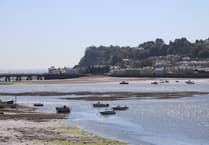NEWLY-DISCOVERED bacteria in Teignbridge waters which could cause serious ear infections and stomach upsets are thriving because of climate change, it’s been claimed.
Global warming is said to be creating conditions for the bacteria to increase, and sewage spills could also help it to spread.
Health experts say that while vibrio alginolyticus cannot be classed as ‘dangerous’, it can make people ill. In the worst cases, ear infections could cause ‘catastrophic’ hearing loss if left untreated.
The bacteria were discovered in the River Teign at Shaldon last year.
Regular swimmers are being advised to wear caps and earplugs, and children who are susceptible to ear infections should avoid putting their heads in the water, particularly in the summer when water temperatures rise.
People should avoid entering the water if they have cuts, grazes or ulcers, and anglers should wear gloves.
The most common causes of stomach problems are uncooked shellfish or fish, and these could contain the bacteria.
The presence of vibrio alginolyticus in the Teign was highlighted by a question posed by a member of the public to a meeting of Teignbridge Council.
Stuart Reynolds asked what plans the council had to respond to ‘the potential threat to public health’ caused by the spread of the bacteria as the temperature of the Teign estuary rises.
He also wanted to know if the council would install a monitor to warn when water temperatures rise above 18C, the ideal conditions for the bacteria to increase.
Council leader Martin Wrigley (Lib Dem, Dawlish NE) said Teignbridge would work with other agencies and partners to ensure that the appropriate actions were taken and people were kept informed.
Members read a report which said the bacteria were a new threat arising out of climate change.
It is possible that vibrio alginolyticus has been present for some time, unnoticed, but it could also be a new phenomenon driven by high sea temperatures.
Samples were taken in the Teign just above Shaldon Bridge after reports of vibrio species at other places along the south coast.
It was previously believed that the sea temperature in the Teignmouth area would not support the bacteria, but record high temperatures last year prompted the fresh tests which were carried out by Dr Sariqa Wagley at the University of Exeter.
Dr Wagley wrote more than two years ago: ‘The increasing abundance and diversity of vibrio bacteria creates health risks not only for people eating seafood, but for those using the sea for recreation purposes.
‘Vibrio bacteria are also a threat to a variety of marine species including shellfish themselves. Disease costs the global aquaculture industry £6 billion a year, and this burden of disease can be devastating.’
Experts say that while there is nothing to suggest a direct link between sewage pollution and the presence of the vibrio alginolyticus bacteria, some research suggests that adding sewage to estuary water can increase the number of the bacteria present.
In response to the question ‘isn’t this just scaremongering?’, the report to the council says: ‘Vibrio is a leading cause of water borne disease worldwide. The diseases caused range from cholera to necrotising fasciitis.
‘In the USA, vibriosis is listed by the Center for Disease Control as a notifiable disease. It is not currently a significant cause of ill health in the UK but as sea temperatures rise it is likely to become an increasing risk.’




